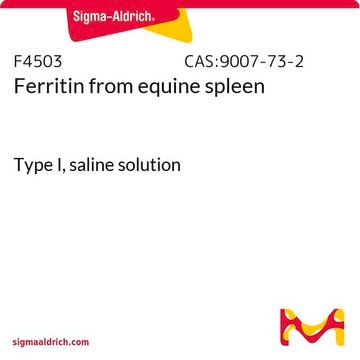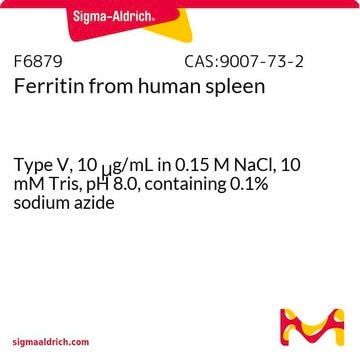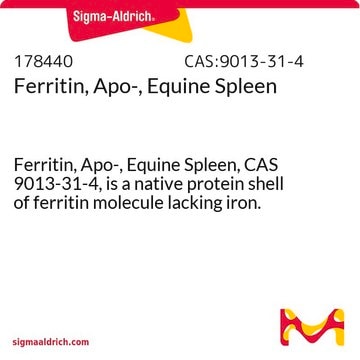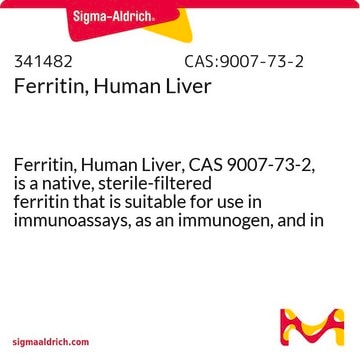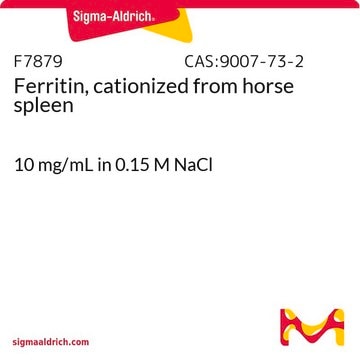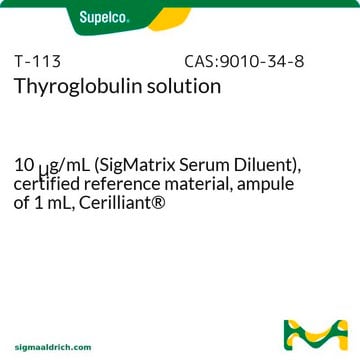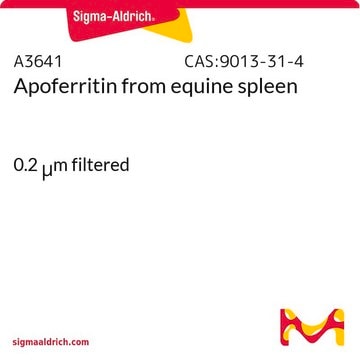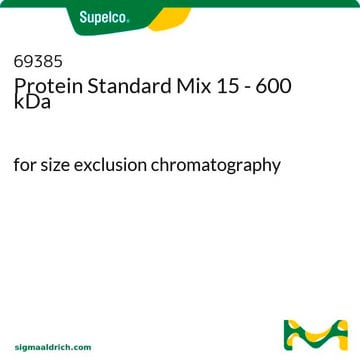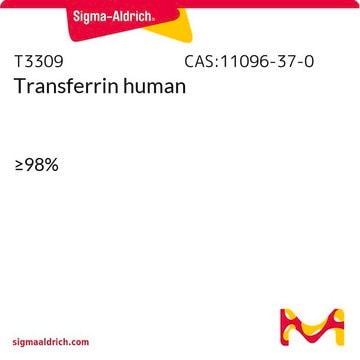F6754
Ferritin from human liver
Type IV, 10 μg/mL
Bejelentkezésa Szervezeti és Szerződéses árazás megtekintéséhez
Összes fotó(1)
About This Item
Javasolt termékek
biológiai forrás
human liver
Minőségi szint
sterilitás
0.2 μm filtered
típus
Type IV
Teszt
≥95% (SDS-GE)
Forma
liquid
molekulatömeg
H subunit ~21 kDa
L subunit ~19 kDa
~440 kDa (a shell of 24 protein subunits (apoferritin) and a core of Fe3+ ions)
kiszerelés
vial of 2 μg
koncentráció
10 μg/mL
tárolási hőmérséklet
2-8°C
Géninformáció
human ... FTH1(2495) , FTL(2512) , FTMT(94033)
Általános leírás
Ferritin comprises 24-subunit and belongs to the ferritin-like diiron-carboxylate protein superfamily. Ferritin exists as heavy (H) and light (L) subunits. Liver ferritin is majorly L subunit and the spleen has the H submit. The L subunit is mapped to human chromosome 9q13.33 and the H subunit 11q12.3.
Alkalmazás
Ferritin from human liver has been used as model protein in size-exclusion high-performance liquid chromatography technique and for synthetic nanopore translocation studies. It has also been used to test its effect on the susceptibility of shrimp (Litopenaeus vannamei) to the white spot syndrome virus.
Biokémiai/fiziológiai hatások
A ubiquitous iron storage protein that plays a key role in iron metabolism. It serves as an intracellular iron reserve (particularly in spleen, liver, intestinal mucosa, and bone marrow) and functions in iron detoxification. Studies have shown that ferritin iron incorporation is mediated by a ferroxidase activity associated with ferritin H subunits and a nucleation center associated with ferritin L subunits. Release of iron from ferritin has an essential role in iron-dependent lipid peroxidation and may contribute to free radical-induced cell damage in vivo. Therefore, by binding iron, ferritin may function as an antioxidant.
Ferritins are part of the host defense system and play a role in response to viral infection in animals. The abnormal levels of ferritin are correlated to many tumors associated with the prostate, breast and brain. High levels of ferritin are implicated in inflammation and macrophage activation syndrome (MAS). Mutations in the light subunit chain can lead to the neurodegenerative disease, hereditary ferritinopathy.
Fizikai forma
Solution in 10 mM Tris, 150 mM NaCl, pH 8.0, and 0.1% sodium azide.
Tárolási osztály kódja
10 - Combustible liquids
WGK
WGK 1
Lobbanási pont (F)
Not applicable
Lobbanási pont (C)
Not applicable
Válasszon a legfrissebb verziók közül:
Már rendelkezik ezzel a termékkel?
Az Ön által nemrégiben megvásárolt termékekre vonatkozó dokumentumokat a Dokumentumtárban találja.
Az ügyfelek ezeket is megtekintették
Yuan-Hwa Ruan et al.
Fish & shellfish immunology, 28(4), 542-548 (2010-01-05)
We examined the physiological (hemolymph glucose, lactate, and lipid) and innate non-specific immune responses (total hemocyte count (THC), phenoloxidase (PO) activity, respiratory bursts (release of superoxide anion, O(2)(-)) and superoxide dismutase (SOD) activity) to white spot syndrome virus (WSSV) in
P Ruscitti et al.
Clinical and experimental immunology, 191(2), 220-228 (2017-09-30)
Macrophage activation syndrome (MAS) is hyperinflammatory life-threatening syndrome, associated typically with high levels of serum ferritin. This is an iron storage protein including heavy (H) and light (L) subunits, categorized on their molecular weight. The H-/L subunits ratio may be
Erik R Anderson et al.
Comprehensive Physiology, 3(1), 315-330 (2013-05-31)
Iron is an essential nutrient that is tightly regulated. A principal function of the liver is the regulation of iron homeostasis. The liver senses changes in systemic iron requirements and can regulate iron concentrations in a robust and rapid manner.
Huimei Huang et al.
Medical science monitor : international medical journal of experimental and clinical research, 25, 3700-3715 (2019-05-20)
BACKGROUND Serum ferritin is a useful tumor marker for renal cell carcinoma (RCC). However, the expression of ferritin heavy chain (FTH1), the main subunit of ferritin, is unclear in primary RCC tissues. In this study, we investigated FTH1 mRNA expression
Alexander Michael Dohnal et al.
International journal of cancer, 119(12), 2870-2877 (2006-10-04)
The potential immunogenicity of acute lymphoblastic leukemia of the T cell (T-ALL), a small subgroup of childhood leukemia with increased risk for treatment failure and early relapse, was addressed by serological identification of leukemia-derived antigens by recombinant expression cloning (SEREX).
Tudóscsoportunk valamennyi kutatási területen rendelkezik tapasztalattal, beleértve az élettudományt, az anyagtudományt, a kémiai szintézist, a kromatográfiát, az analitikát és még sok más területet.
Lépjen kapcsolatba a szaktanácsadással